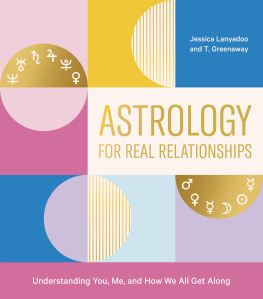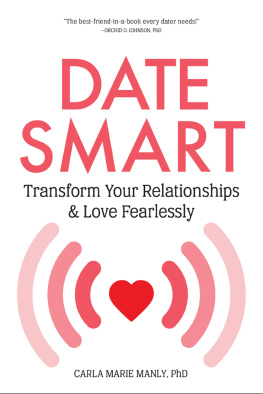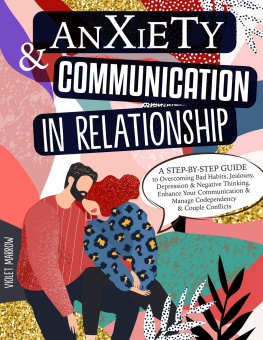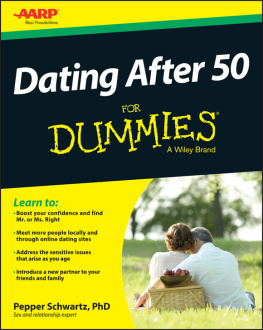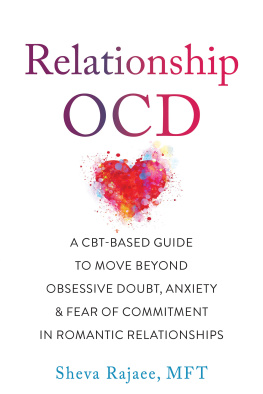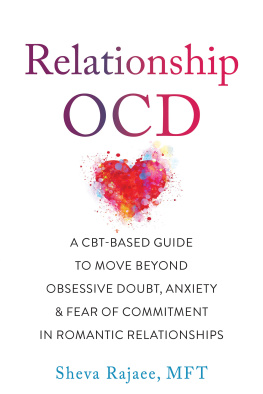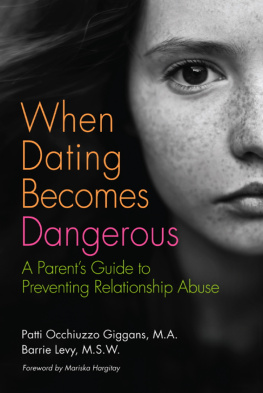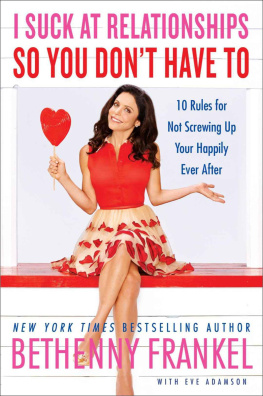
Contents
OVERTHINKING about you
Navigating Romantic Relationships When You Have Anxiety, OCD, and/or Depression
Allison Raskin
workman publishing new york
To my sister, Jocelyn, who has been there for every single breakup and will one day stand next to me at my wedding
Note to the Reader
Before we dive in, Id like to acknowledge that I am writing this book from the perspective of a white, straight, cis woman. While I have struggled with my mental health for almost my entire life, I have done so from a place of extreme privilege. In addition to familial support, I have also had physical and financial access to the best treatment available. This is not the case for many people, and it would be disingenuous of me to imply otherwise.
The sad reality is that the majority of clinical psychologyincluding the research the field is built uponis geared toward white westerners. Although many strides have been taken in recent years to include a multicultural approach to counseling, there is still a lot of work needed to repair the relationship between the mental health field and marginalized clientele. People from marginalized groups are also less likely to receive care due to cultural, racial, and socioeconomic disparities. So while I encourage the use of professional mental health services throughout this book, I also want to recognize and validate why some of you might be reluctant or unable to do so.
Its equally important to acknowledge that the intersection of mental health and dating is often more complex if you are part of the LGBTQIA+ community. According to the National Alliance on Mental Illness (NAMI), LGB adults are more than twice as likely as heterosexual adults to experience a mental health condition. Transgender individuals are nearly four times as likely as cisgender individuals to experience a mental health condition. These statistics are heartbreaking and show the damaging effects of marginalization and disenfranchisement. I am not able to speak to these added complexities personally, nor would I attempt to, but I use masculine, feminine, and gender-neutral pronouns throughout in the hope that everyone will be able to see themselves in these pages. While I recognize that I have limited personal experience, my goal is for this book to be as inclusive as possible.
Lastly, this book discusses suicidal ideation, self-harm, fat-antagonism, and weight loss and gain. Trigger warnings will be provided at the beginning of each chapter when needed. Please read responsibly (and with a lot of self-love).
Resources
For those located in the United States, check out the following resources for more information.
Inclusive Therapists
inclusivetherapists.com
A mental health network that centers the needs of Black, Indigenous, and People of Color (BIPOC) and the 2SLGBTQIA+ community; offers resources; and helps pair clients with therapists who are the right cultural fit.
National Queer and Trans Therapists of Color Network
nqttcn.com
A healing justice organization that aims to increase access to social justiceoriented mental health services by helping queer and trans people of color (QTPoC) locate QTPoC mental health practitioners across the country.
Therapy for Black Girls
therapyforblackgirls.com
An online space dedicated to encouraging the mental wellness of Black women and girls.
The Trevor Project
thetrevorproject.org
Call 1-866-488-7386
A national 24-hour, toll-free confidential suicide hotline for LGBTQIA+ youth.
The LGBT National Help Center
glbtnationalhelpcenter.org
Provides free and confidential peer support for people in the LGBTQIA+ community through hotlines, chat rooms, and resources.
National Suicide Prevention Lifeline
Call 1-800-273-8255
suicidepreventionlifeline.org
Includes online chat options.
National Alliance on Mental Illness (NAMI)
nami.org
Provides advocacy, education, support, and public awareness so that all individuals and families affected by mental illness can build better lives.
Educational Resources
International OCD Foundation
iocdf.org
Anxiety & Depression Association of America
adaa.org
Introduction
What Is This Book?
TRIGGER WARNING: Mention of suicidal ideation
A few years ago, my boyfriend at the time was flying back to Los Angeles after some unmemorable trip. Airplanes have always been a big trigger for me, so I sat nervously in my apartment waiting for his estimated time of arrival. That time came and went. My anxiety kicked into high gear. I started calling and texting, desperate for proof that he had survived the flight. My fear was twofold: (1) He was definitely dead, along with two hundred other people, and (2) he was alive and well, but didnt care about me at all. I wasnt sure what was worse. Said boyfriend knew about my plane anxiety. He knew I worried he would die every time he boarded a plane. He knew I expected him to check in the moment he touched down. And yet... radio silence.
Not to completely ruin the suspense, but my boyfriend survived. (Our relationship did not.) When I finally got him on the phone, there was some long-forgotten explanation for the delay, most likely involving a dead phone battery. But by the time we connected, I was already inconsolable. Exhausted from traveling, he passively listened to me cry, unable or unwilling to understand my distress. He doesnt experience plane anxiety, so why should I? Its illogical! Planes are safer than cars! Of course he was going to get in touch eventually. Wasnt that obvious?!
Heres the thing: Logic and anxiety do not mix. Theyre like oil and water. Or pugs and strenuous exercise. Not a match! And if you arent being forced to read this against your will, you already know that, because youve probably experienced something similar. It is one of the most basic tenets of mental illness. Its an illness! It doesnt make sense! For those of us with mental health issues, we not only have to live with this paradox, but we are also tasked with explaining it to our partners. This is pretty fucking annoying and more difficult than some might think. I think we can all agree that romantic relationships are challenging for everyone. But when you throw anxiety, OCD, and/or depression into the mix, the idea of happily ever after might feel more like a propaganda campaign than something actually achievable. Im here to change your mind. Your dating history doesnt have to predict your dating future. While those of us with these conditions might have to work a bit harder at achieving healthy relationships, we are more than capable of doing so through self-awareness, expert communication, and productive dating (e.g., not wasting your time on the wrong people even if theyre really, really, really good-looking).
Right about now you might be wondering, This all sounds good, but who the hell are you? My names Allison, and Im an author, screenwriter, podcaster, and (mostly former) YouTuber. Ive also been battling my own brain since I was four years old. Until I got sick, I was a happy, carefree child. Easygoing. Down to party. And then I contracted strep throat. A few weeks later, my entire demeanor changed due to PANDASPediatric Autoimmune Neuropsychiatric Disorders Associated with Streptococcal Infections. (Not the adorable bear, unfortunately.) Basically, the strep infection changed my brain, and I was suddenly so mentally unwell that I announced to my father, I need to see a doctor. Something inside me is making me sad. Pretty astute for a preschooler, dont you think?! Also, very tragic and disturbing for my poor parents.
Next page

